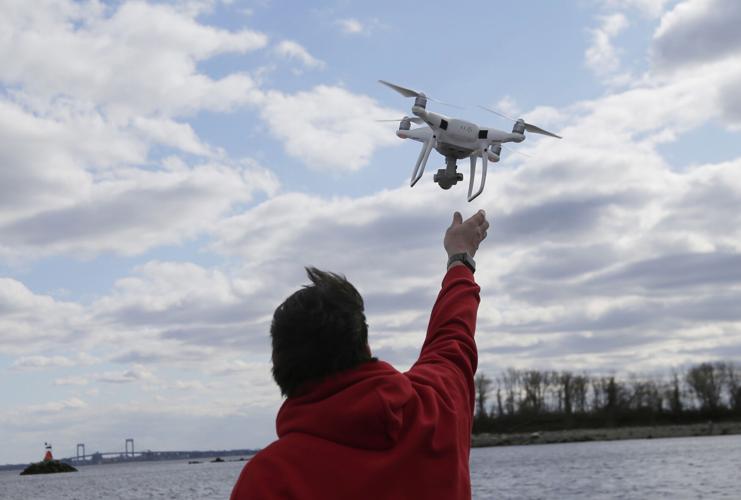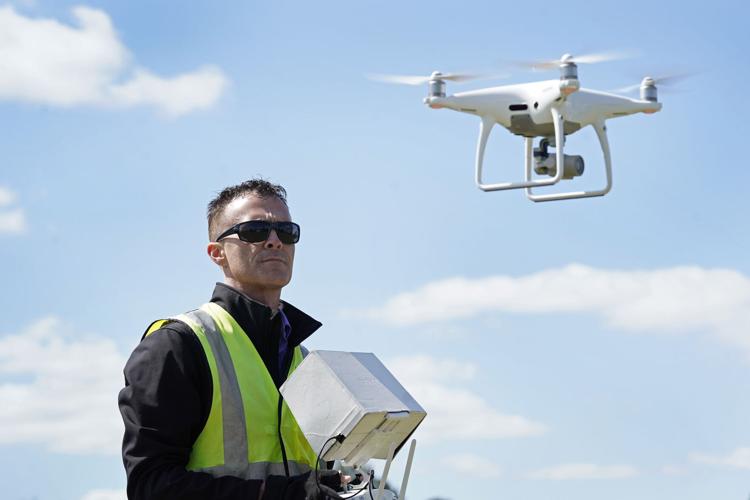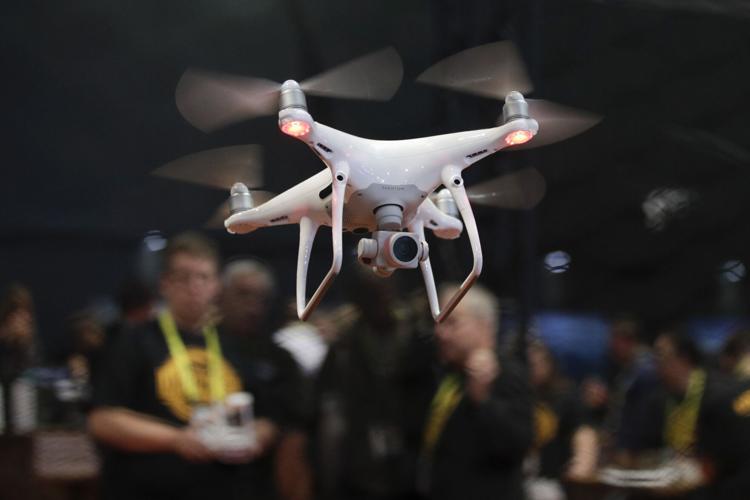Drones for commercial and recreational use grew rapidly in popularity despite restrictions on who can operate them and where they can be flown.
No-fly zones are enforced around airports, military installations, nuclear plants, sports stadiums during games and certain landmarks, including the Statue of Liberty.
However, not everybody follows the rules. Sightings at airports shut down flights in a few instances.
Drone pilot Michael Downey says that the drones seem to be following all FAA regulations.
Reported sightings of what appear to be drones flying over New Jersey at night in recent weeks created anxiety among some residents, in part because it is not clear who is operating them or why. Some state and local officials called for stricter rules to govern drones.
Most, but not all, of the drones spotted in New Jersey appeared to be larger than those typically used by hobbyists. Officials said many of the objects seen may have been planes rather than drones.
The unmanned aircraft are legal in the state for recreational and commercial use but are subject to local and Federal Aviation Administration regulations and flight restrictions. Operators must be FAA certified.

A drone operator helps retrieve a drone April 29, 2018, after photographing over Hart Island in New York.
Who regulates drones?
The FAA is responsible for the regulations governing their use, and Congress wrote some requirements into law.
With a 2018 law, the Preventing Emerging Threats Act, Congress gave certain agencies in the Homeland Security and Justice departments authority to counter threats from unmanned aircraft to protect the safety of certain facilities.
New drones must be outfitted with equipment allowing law enforcement to identify the operator, and Congress gave the agencies the power to detect and take down unmanned aircraft that they consider dangerous.
The law spells out where the counter-drone measures can be used, including "national special security events" such as presidential inaugurations and other large gatherings of people.
A U.S. senator called for mysterious drones spotted over the sensitive areas in New Jersey and other parts of the Mid-Atlantic region to be “shot down, if necessary."
“We should be doing some very urgent intelligence analysis and take them out of the skies, especially if they’re flying over airports or military bases,” Sen. Richard Blumenthal of Connecticut said, as concerns about the drones spread across Capitol Hill.

Michael Jones operates his drone, April 2, 2021, in Goldsboro, N.C. A federal appeals court ruled May 20 that the North Carolina board that regulates land surveyors didn't violate the drone photography pilot's constitutional rights when it told him to stop advertising and offering aerial map services because he lacked a state license.
What does it take to be a drone pilot?
To get a "remote pilot certificate," you must be at least 16 years old, be proficient in English, pass an aeronautics exam and not suffer from a "mental condition that would interfere with the safe operation of a small unmanned aircraft system."
Are drones allowed to fly at night?
Yes, but the FAA imposes restrictions on nighttime operations.
Most drones are not allowed to fly at night unless they are equipped with anti-collision lights that are visible for at least 3 miles.
The White House says a review of the reported drone sightings flying over sensitive areas in New Jersey and other parts of the Mid-Atlantic region has so far revealed no evidence of a "national security or a public safety threat or have a foreign nexus."
Are drones a hazard?
Over the past decade, pilots reported hundreds of close calls between drones and airplanes, including airline jets. In some cases, airplane pilots had to take evasive action to avoid collisions.
Drones buzzing over a runway caused flights to be stopped at London's Gatwick Airport during the Christmas travel rush in 2018 and again in May 2023. Police dismissed the idea of shooting down the drones, fearing that stray bullets could kill someone.
Advances in drone technology made it harder for law enforcement to find rogue drone operators — bigger drones in particular have more range and power.

An exhibitor demonstrates a drone flight Jan. 5, 2017, at CES International in Las Vegas.
Will rules get tougher?
Some state and local officials in New Jersey called for stronger restrictions because of the recent sightings, and that has the drone industry worried.
Scott Shtofman, director of government affairs at the Association for Uncrewed Vehicle Systems International, said putting more limits on drones could have a "chilling effect" on "a growing economic engine for the United States."
"We would definitely oppose anything that is blindly pushing for new regulation of what are right now legal drone operations," he said.
AirSight, a company that sells software against "drone threats," says more than 20 states enacted laws against privacy invasion by drones, including Peeping Toms.
Will Austin, president of Warren County Community College in New Jersey and founder of its drone program, says it's up to users to reduce public concern about the machines. He said operators must explain why they are flying when confronted by people worried about privacy or safety.
"It's a brand new technology that's not really understood real well, so it will raise fear and anxiety in a lot of people," Austin said. "We want to be good professional aviators and alleviate that."
Holiday Rush: The Airports With the Biggest Traffic Surge During the Holiday Season
Holiday Rush: The Airports With the Biggest Traffic Surge During the Holiday Season
Updated
Photo Credit: AnnaStills / Shutterstock
As the holiday season approaches, millions of travelers are preparing to pack their bags and head to the skies, making this one of the busiest times of the year for air travel. Airports across the United States experience a significant surge in passenger traffic, with some hubs seeing more dramatic increases than others. Whether travelers are visiting family, heading for a vacation, or flying for business, the peak holiday season creates a challenge for both airports and airlines to manage the spike in demand.
In response to rising air travel demand, the Federal Aviation Administration (FAA) has announced $289 million in grants to 129 airports across 40 states. Funded under President Biden’s Bipartisan Infrastructure Law, these grants will support terminal expansions, baggage system upgrades, runway enhancements, and air traffic infrastructure improvements. As air travel hits record highs—including the TSA screening nearly 3 million passengers in a single day in June—these investments will help airports better handle surges in traffic during the busy holiday season.
Average Daily Flight Passenger Traffic Recovery After the Pandemic
Updated
Source: Luxury Link analysis of Transportation Security Administration (TSA) data
Air travel has rebounded significantly since the sharp decline caused by the COVID-19 pandemic, with average daily passenger traffic now exceeding pre-pandemic levels. Based on Transportation Security Administration (TSA) data, daily passenger traffic during the 2019 holiday season—or the periods surrounding Thanksgiving and winter holidays—averaged nearly 2.3 million, but TSA throughput dropped dramatically to just less than 1 million in 2020. As restrictions eased, air travel slowly recovered, and by 2023, daily passengers reached nearly 2.5 million—surpassing 2019 levels.
Non-holiday passenger traffic has followed a similar trend, with 2023’s daily average of over 2.3 million passengers also exceeding the 2019 figure. With 2024 non-holiday traffic already averaging just under 2.5 million, this holiday season is shaping up to be one of the busiest in recent memory.
Change in Airport Traffic During the Holiday Season by State
Updated
Source: Luxury Link analysis of Transportation Security Administration (TSA) data
Holiday air traffic patterns vary significantly across different states, with some regions experiencing far greater surges in daily passenger throughput than others. States with major tourist destinations and warmer climates, such as Florida (+12.7%) and Arizona (+10.9%), see some of the largest surges in daily passenger traffic during the holiday season. Similarly, states like North Dakota (+11.8%) and Kansas (+10.5%) experience notable increases, potentially due to their smaller airports handling a disproportionate amount of local and regional holiday traffic. In contrast, colder and less accessible states like Maine (-26.0%) and Alaska (-17.0%) see declines, as fewer travelers venture to these destinations during the winter months.
Delaware stands out as an outlier, with an 83.1% increase in daily passenger traffic, driven by the operations of its only commercial airport, Wilmington Airport (ILG). Delaware’s traffic fluctuations have been skewed by the departure of Frontier Airlines in 2022 and the introduction of Avelo Airlines in 2023, leading to a dramatic change in the state's seasonality.
At the individual airport level, Fort Lauderdale/Hollywood International (FLL) tops the list of large hub airports with a 16.3% increase, while airports in other warm, tourist destinations like Daniel K. Inouye International (HNL) in Hawaii and Tampa International (TPA) both see traffic increases of over 12%. On the other hand, Harry Reid International (LAS) in Las Vegas experiences a 4.3% decline in holiday traffic, the largest decrease among large hub airports.
Below is a breakdown of the top and bottom ranked large hub, medium hub, and small hub U.S. airports for airport traffic changes during the holiday season. The analysis was conducted by Luxury Link—an online booking platform specializing in luxury travel— using data from the Transportation Security Administration (TSA). For complete results, see the full report Holiday Rush: The Airports with the Biggest Surge in Traffic During the Holiday Season on Luxury Link.
Large Hub Airports with the Biggest Surge in Airport Traffic During the Holiday Season
Updated
Medium Hub Airports with the Biggest Surge in Airport Traffic During the Holiday Season
Updated
Small Hub Airports with the Biggest Surge in Airport Traffic During the Holiday Season
Updated
Methodology
Updated
Photo Credit: AnnaStills / Shutterstock
The data in this analysis come from the Transportation Security Administration’s (TSA) FOIA Electronic Reading Room. Researchers ranked airports and states by the percentage change in the daily passenger traffic during the holiday season compared to the rest of the year. For the purposes of this analysis, the holiday season was aligned to national flight traffic trends and considered to be the Thanksgiving holiday—the Friday prior to Thanksgiving through the Monday after—and the winter holiday period—the Friday before the full week leading up to Christmas through January 2nd of the next year. To avoid distortion from the COVID-19 pandemic and its aftermath, calculations were based on the average of 2022 and 2023 data.
For complete results, see Holiday Rush: The Airports With the Biggest Traffic Surge During the Holiday Season on Luxury Link.
Change in Airport Traffic During the Holiday Season by Airport Size
Updated
Source: Luxury Link analysis of Transportation Security Administration (TSA) data
During the Thanksgiving and winter holiday seasons, larger airports see the most significant increases in daily passenger traffic compared to non-holiday periods. Based on 2022 and 2023 data, large hub airports experience a 7.2% increase in daily traffic, while medium hubs follow closely with a 6.2% rise. Smaller airports see more modest increases, with small hubs rising by 4.5%, nonhub primary airports growing by just 1.5%, and nonhub nonprimary airports—the smallest airport commercial service category by annual enplanements—actually experience a 6.8% decrease during the holidays.






